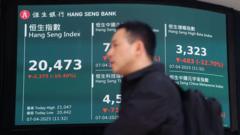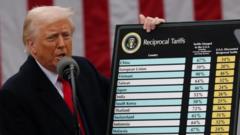In a significant move reminiscent of Brexit, President Trump's newly announced tariffs signal a departure from free trade principles, but economists argue that the global trading system may adapt and endure despite challenges.**
### Trump's Tariffs: A Shift Away from Free Trade, Yet a Global Resilience

### Trump's Tariffs: A Shift Away from Free Trade, Yet a Global Resilience
**Despite the impact of tariffs on global commerce, experts believe free trade persists beyond the U.S.'s withdrawal.**
In a dramatic announcement from the White House Rose Garden, President Trump declared a sweeping set of tariffs affecting over 100 countries. This bold initiative, termed his "liberation day," mirrors past events like Brexit, where significant political decisions sought isolation from global partnerships. Trump's tariffs are perceived as a fundamental alteration to the established global economic structure, similarly to Britain's decision to exit the European Union nearly a decade earlier.
The repercussions of Trump's actions extend far into the international trade arena, primarily due to the United States' central role in the global economy. However, much remains uncertain about the long-term impact of these tariffs. Economists point out that there is potential for Trump to reconsider if economic conditions worsen, reflecting the volatility that accompanies such drastic policy decisions.
Despite the disruptions these tariffs may cause, experts like Eswar S. Prasad, a trade policy professor at Cornell University, suggest that while this move signifies a retreat from the previous era of unrestricted free trade, it does not spell the end of it. The significant advantages provided by free trade are likely to motivate the global community to explore pathways to sustain trade activities collectively, albeit with increased self-reliance amongst individual nations.
Historically, the European Union remained intact after the UK’s exit, and the current political dialogue in London hints at growing connections with Europe despite the past upheaval. Therefore, as the global trading environment faces the aftershocks of Trump's tariffs, the resilience of international trade structures may very well emerge, encouraging nations to find innovative ways to continue trading with one another amidst a landscape marked by new challenges.
The repercussions of Trump's actions extend far into the international trade arena, primarily due to the United States' central role in the global economy. However, much remains uncertain about the long-term impact of these tariffs. Economists point out that there is potential for Trump to reconsider if economic conditions worsen, reflecting the volatility that accompanies such drastic policy decisions.
Despite the disruptions these tariffs may cause, experts like Eswar S. Prasad, a trade policy professor at Cornell University, suggest that while this move signifies a retreat from the previous era of unrestricted free trade, it does not spell the end of it. The significant advantages provided by free trade are likely to motivate the global community to explore pathways to sustain trade activities collectively, albeit with increased self-reliance amongst individual nations.
Historically, the European Union remained intact after the UK’s exit, and the current political dialogue in London hints at growing connections with Europe despite the past upheaval. Therefore, as the global trading environment faces the aftershocks of Trump's tariffs, the resilience of international trade structures may very well emerge, encouraging nations to find innovative ways to continue trading with one another amidst a landscape marked by new challenges.





















